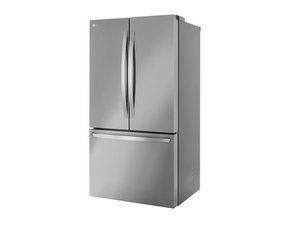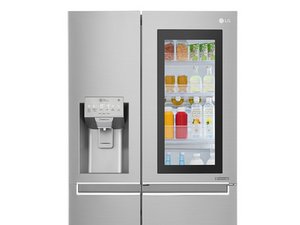Introduction
Your refrigerator makes humming noises as part of normal operation, but sometimes the volume or duration increases a lot. Let's look at some possible causes after we look at what is normal.
Normal Sounds
Your LG refrigerator will make some noises as it operates. Sometimes what is normal might not sound that way.
Here are the things that normally hum, usually not too noticeable: the ice maker, the ice dispensing system, the evaporator fan, and the condenser fan.
The compressor makes a noticeable low hum. Sometimes, the hum will grow louder when the refrigerator has to cool down more. Like after a defrost cycle.
Changes in the humming can happen. You may have moved your fridge from your kitchen to a different location, like a garage.
A change in the cabinet work or flooring can make your fridge sound louder.
Humming can also be amplified by cabinet work if the fridge is touching it.
If nothing here applies, move to the causes.
Causes
Your Ice maker may hum more loudly if it is struggling to operate properly. You may notice that the ice maker isn't producing ice. Possibly, the mold heater is failing, and the unit can't remove the cubes easily, and it gets noisy. You might also find that the tray drive on flip-over and twist units is failing, and it gets very noisy when it tries to empty the cubes.
The best way to check this is to observe your fridge closely (especially listen) when it is trying to produce ice. If you hear the unusual humming at that point, you have probably found the issue.
Here is a LG Refrigerator Ice Makers in case a replacement is needed.
The water inlet valve can fail as well and sometimes makes a louder hum when that is occurring, especially if the plunger is jammed. You may get no ice production or very small pieces because the valve won't open properly. Here is a guide from one model showing how to replace it.
Here is a link to some [[ invalid parts link ]] for replacement.
If the ice-making system checks out, go on to the next item.

- 1 - 2 hoursModerate

Find compatible replacement parts for your LG Refrigerator. All parts and fix kits are backed by the iFixit Quality Guarantee.

Find compatible replacement parts for your LG Refrigerator Refrigerator. All parts and fix kits are backed by the iFixit Quality Guarantee.
Sometimes an ice block can form, and the auger can't break it free. Then you will likely hear a humming noise each time it tries to dispense. You should check the ice bucket for a clog and break it up with a wooden implement or use a steamer or warm water to melt it.
Also, the auger may be bent, or the motor can fail and not start, although it can hum. This may be a failed capacitor which is located in the compartment with the main control board on the rear of the fridge. Here is a guide to show you more.
Another problem can be the water inlet valve for the water dispensing system. This is separate from the valve for filling the ice tray. This valve can also fail and make a humming noise. Often, it may continue to work for some time, but the noise lets you know something is going wrong. Here is a guide for replacing the water inlet valve.
If the dispensing system checks out, go on to the next item.

- 20 - 25 minutesModerate

- 1 - 2 hoursModerate
Listen to where the humming is coming from. Does it sound like it is inside the Refrigerator compartment or Freezer compartment?
If the hum is coming from another location, skip this and go down to Condenser Fan Failure.
Ice, bad bearings, and electrical failures are all ways that the evaporator fan can start making a humming sound.
The fan blades may start striking ice build-up because of a failed defrost system. Running a forced defrost cycle is a good idea to see if there is just too much ice. You can take a look at the back wall of the freezer; if there is ice on the back wall, there is likely ice in the evaporator area, and this may impede the fan.
- Sometimes the motor may be jammed with ice and may hum.
- The fan blades can be damaged by striking ice and may make a louder humming sound.
- The sound of failed bearings on the motor will make a very audible hum.
- The fan may be unable to start and will hum instead. Replace it if this occurs.
Here's a guide for an LG refrigerator evaporator fan motor replacement.
If these things check out, go on to the next item.

- 1 - 2 hoursModerate
Occasionally, the motor, or the bearings on the motor, will start to fail, and the fan becomes much louder. Sometimes, a piece of debris may make its way in close to the fan and create a humming noise when the blades strike it. If the fan fails entirely, you likely won't have much sound at all since the unit will shut down the compressor because of thermal overload.
Here is a guide for replacing the condenser fan motor on an LG refrigerator.
If things checked out, go on to the next step.

- 1 - 2 hoursDifficult
Abnormal compressor sounds, like loud humming, occur when the compressor never slows down or stops. Many compressors are set up to run continuously but not at a high setting. If the compressor is continuously running more loudly, you should check your refrigerator for some of these items; some aren't really compressor failures, but the compressor will be affected as far as making noise.
Excessive Frost
If you see frost building on the rear panel of your freezer, it suggests a failure in the defrost system. The evaporator probably has an accumulation of frost or ice. These will impede airflow, and the compressor will work harder trying to cool the freezer properly. You probably have a failed defrost system.
Refrigerant Leak
This is harder to spot, but you might hear a slight hiss right after the compressor shuts off (if it ever does) or, more commonly, see oil on portions of the refrigerant tubing near the compressor.
When you remove the cover of your evaporator, you might see frost on your evaporator that only covers a portion of the coils. Usually, the freezer and refrigerator will be showing higher temperatures as well. You will likely hear the compressor running more.
Refrigerant leaks need professional assistance. If you don't see any issues go on to the next item.
Sealed System Plugged
There may be debris in your sealed system so that refrigerant can't flow. This is a job for a qualified technician. Usually, there will be little or no cooling in the refrigerator if this is the case.
This can occur if a refrigerator is moved improperly. Tipping many refrigerators to the side will allow compressor lubricant to get into the capillary tube, and once there, it is very difficult to move it through.
If you have checked these things and found nothing, you should consult an appliance repair professional.
Additional Information
Long but excellent video by LG on refrigerator noises. Worth the time. Can't find the video referenced at the beginning.
Shorter, but helpful video from LG on refrigerator sounds.
You're seeing solutions for LG Refrigerator. Select your model to find parts for your device.







